|
|
|
Sort Order |
|
|
|
Items / Page
|
|
|
|
|
|
|
| Srl | Item |
| 1 |
ID:
178033
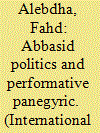

|
|
|
|
|
| Summary/Abstract |
The poet ʿAli ibn Jabala, also called al-ʿAkawwak, was a little known but significant poet who lived during the late 8th and early 9th centuries. This article examines his poetry in its political and cultural context to delineate the literary devices exploited by the poet in his poems of praise. Moreover, this paper interprets existing prose anecdotes claiming that al-ʿAkawwak's panegyric poem to the caliph al-Maʾmun's commander, Abu Dulaf al-ʿIjli, made the caliph so furious that he ordered the poet's execution, despite the poet having never composed any verses overtly criticizing the caliph. The argument is made that, within the tense political atmosphere of the time, the style that the poet embraced in praising the two commanders, Abu Dulaf al-ʿIjli and Humayd al-Tusi, intensified al-Maʾmun's anger toward the poet.
|
|
|
|
|
|
|
|
|
|
|
|
|
|
|
|
| 2 |
ID:
190941
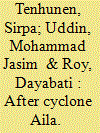

|
|
|
|
|
| Summary/Abstract |
This article compares the politics of climate change in the Sundarbans region in Bangladesh and India based on ethnographic fieldwork in four villages and among migrants from these villages in Kolkata and Khulna city by focusing on the long aftermath of cyclone Aila. The comparison highlights different policy options and framings of extreme weather events . Ten years after the cyclone, the aftermath of Aila continues in both regions we studied in Bangladesh and India, but partly for different reasons. In our study areas in Bangladesh, the aftermath of Aila reinforced the neglect of coastal livelihoods, whereas, in the communities we studied in India, Aila spurred new investments in the affected areas. By comparing how the political is interwoven with the natural, we demonstrate how Aila's lingering impacts have emerged as part of local power relationships and diverse forms of agency. We highlight the multiplicity of policy responses and people's practices not only between communities and countries facing a similar predicament but also within the communities themselves. We argue that the politics of climate change is not only about climate change policy to mitigate the impact of ecological disasters but also about the reconstruction of political agents and practices.
|
|
|
|
|
|
|
|
|
|
|
|
|
|
|
|
| 3 |
ID:
194977


|
|
|
|
|
| Summary/Abstract |
This article argues that even as the legal dispute over the Ram Janmabhumi site remained unresolved for decades, an unimpeded surge in Marwari mercantile financing of new temples for Hanumān, Rāma’s most celebrated devotee, provided the material foundation for a nationwide space exalting Rāma through the worship of Hanumān. Living in the pan-Indian urban diaspora and tracing descent to Rajasthan, Marwari merchants coalesced into devotional organizations dedicated to Hanumān and allied Vaiṣṇava deities (such as Rāma and Kṛṣṇa), initially centered on shrines in Rajasthan itself, from the 1980s on – coeval with the Ram Janmabhumi movement’s escalation. Marwaris had long been known as philanthropists for various social causes, but this article suggests that their philanthropy had evolved by the 1990s. Since the destruction of the Babri mosque at that time, Marwaris funded numerous new temples for Hanumān, in which Rāma was of course also revered. Some Marwaris assumed advisory roles in Hindu activist groups, seemingly embracing a commitment to restore canonical Hindu values eroded by centuries of foreign rule and modern caste politics. This article thus looks at Marwari patronage of deities’ temples as anticipating a post-2019 Ayodhya verdict Hindu devotional geography.
|
|
|
|
|
|
|
|
|
|
|
|
|
|
|
|
| 4 |
ID:
142609


|
|
|
|
|
| Summary/Abstract |
This article explains the demise of Sierra Leone's Revolutionary United Front (RUF) rebellion. It argues that the main cause of this fate was the group's relationship with its primary sponsor, Charles Taylor. The RUF's dependency on Taylor's patronage, coupled with the rebellion's weak organisational endowments harmed the group's prospects of success. Based on original research, the article shows how Taylor used the RUF as a strategic instrument for his own regional interests, which led to the group's unravelling. More broadly, the article speaks about proxy warfare in Africa and how the relationship between resource flows and rebellion are not always beneficial to rebels as one might expect.
|
|
|
|
|
|
|
|
|
|
|
|
|
|
|
|
| 5 |
ID:
184995
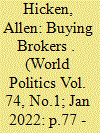

|
|
|
|
|
| Summary/Abstract |
Studies of electoral clientelism—the contingent exchange of material benefits for electoral support—frequently presume the presence of strong parties. Parties facilitate monitoring and enforcement of vote buying and allow brokers to identify core voters for turnout buying. Where money fuels campaigns but elections center around candidates, not parties, how do candidates pitch electoral handouts? The authors analyze candidates’ distribution of cash during an Indonesian election. Drawing upon varied data, including surveys of voters and brokers, candidates’ cash-distribution lists, and focus-group discussions, they find heavy spending but little evidence of vote buying or turnout buying. Instead, candidates buy brokers. With little loyalty or party brand to draw on, candidates seek to establish credibility with well-networked brokers, who then protect their turf with token payments for their own presumed bloc of voters. The authors find little evidence of monitoring of either voter or broker behavior, which is consistent with their argument that these payments are noncontingent.
|
|
|
|
|
|
|
|
|
|
|
|
|
|
|
|
| 6 |
ID:
097146
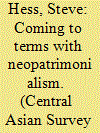

|
|
|
|
|
| Publication |
2010.
|
| Summary/Abstract |
The author examines how patrimonial forms of domination, as conceived in a Weberian sense, came to pervade the formal bureaucratic apparatuses developed under both Soviet Marxist-Leninist (from the late 1970s) and American-coalition liberal designs (since 2001), creating hybrid states defined by neopatrimonialism. Drawing lessons from the survival and eventual collapse of the Najibullah regime following the 1989 withdrawal of Soviet forces, the article finds that the continued extension of aid and arms, and not the presence of foreign military forces, proved most effectual in sustaining the Afghan leader's patronage-based grip on power. Arguing that the contemporary regime of Hamid Karzai has likewise adopted a neopatrimonial-type rule, these findings have clear implications for current American policy in Afghanistan. America, Afghanistan's ultimate patron, can better ensure stability in the region by extending aid to Karzai than by continuing a large and costly military occupation of the region.
|
|
|
|
|
|
|
|
|
|
|
|
|
|
|
|
| 7 |
ID:
113868


|
|
|
|
|
| Publication |
2012.
|
| Summary/Abstract |
This article explores the socio-economic significance of patronage at the edge of the Indonesian state. It argues that marginal borders and adjacent borderlands where state institutions are often weak, and state power continuously waxes and wanes, encourage the growth of non-state forms of authority based on long-standing patron-client relationships. These complex interdependencies become especially potent because of traditionally rooted patterns of respect, charismatic leadership and a heightened sense of autonomy among borderland populations. The article contends that an examination of these informal arrangements is imperative for understanding the rationale behind border people's often fluid loyalties and illicit cross-border practices, strained relationships with their nation states and divergent views of legality and illegality. The article contributes to recent anthropological studies of borders and believes that these studies could gain important insight by re-examining the concept of patronage as an analytical tool in uncovering circuits of licit and illicit exchange in borderlands.
|
|
|
|
|
|
|
|
|
|
|
|
|
|
|
|
| 8 |
ID:
101591
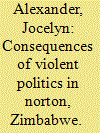

|
|
|
|
|
| Publication |
2010.
|
| Summary/Abstract |
The lasting consequences of violent politics in Zimbabwe cannot be fully grasped without exploring both their institutional and material contexts and local interpretations of the meaning of particular acts of violence. Drawing on narratives of political violence from the town of Norton, three points are made. First, the extreme electoral violence of 2008 was interpreted by opposition members as an almost inexplicable moment of rupture. As a result, it damaged social relations in lasting ways. Second, the powerful link between the ruling party's coercive politics and people's livelihoods in a context of economic collapse meant that violence had deeply damaging effects on every aspect of people's lives from which many have not yet recovered. Third, regardless of their party affiliation, people's political relations with Zimbabwe's Inclusive Government, established in 2009, have been powerfully shaped by their understandings of the material and other obligations constituted through violence and suffering in previous years.
|
|
|
|
|
|
|
|
|
|
|
|
|
|
|
|
| 9 |
ID:
113243
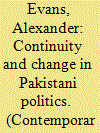

|
|
|
|
|
| Publication |
2012.
|
| Summary/Abstract |
Pakistan's political system is anchored around a series of patronage networks that favour continuity over radical change. These networks are not immune from social, economic and political change, although these tend to reshape rather than restructure the system. Pakistani nationalism will likely influence Pakistani politics more than Islamism.
|
|
|
|
|
|
|
|
|
|
|
|
|
|
|
|
| 10 |
ID:
180259


|
|
|
|
|
| Summary/Abstract |
Despite the proliferation of literature on large-scale land acquisitions (LSLA) in Africa, few empirical studies exist on how patronage networks combine with socio-cultural stratification to determine the livelihood outcomes for African agrarian-based communities. This article draws from ethnographic research on Cameroon to contribute to bridging this gap. We argue that lineage and patronage considerations intersect to determine beneficiaries and losers during LSLA. Second, we show that LSLA tend to re-entrench existing inequalities in power relations that exist within communities in favour of people with traceable ancestral lineage. Concomitantly, non-indigenous groups especially migrants, bear the brunt of exclusion and are unfortunately exposed to severe livelihood stresses due to their inability to leverage patronage networks and political power to defend their interests. We submit that empirical examination of the impacts of land acquisitions should consider the centrality of power and patronage networks between indigenes and non-indigenes, and how this socio-cultural dichotomy restricts and/or mediates land acquisition outcomes in Cameroon.
|
|
|
|
|
|
|
|
|
|
|
|
|
|
|
|
| 11 |
ID:
120213
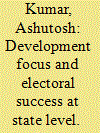

|
|
|
|
|
| Publication |
2013.
|
| Summary/Abstract |
Emergence of regional states in contemporary India as an effective arena for political and economic development has given state-level leaders a growing power. In the present coalition era, which reflects such regionalisation, this brings increasing prominence to effective state-based parties and their leaders. Focusing on recent politics of Bihar, this article shows in what ways Nitish Kumar, Chief Minister of Bihar, since 2005, unlike his predecessor Lalu Yadav, comes across as 'unusual'. Setting aside neo-patrimonial political tendencies, much in vogue among the new crop of state leaders, Nitish Kumar has instead focused on channelling both private and public resources to provide quality governance in an erstwhile 'failed state'. This, more than rootedness in a traditional community or vote bank, may largely explain continued electoral success, though a leader also depends on those around him, with all the risks for effective implementation that this entails.
|
|
|
|
|
|
|
|
|
|
|
|
|
|
|
|
| 12 |
ID:
176491


|
|
|
|
|
| Summary/Abstract |
Does a leader's ethnicity affect the regional distribution of basic services such as education in Africa? Several influential studies have argued in the affirmative, by using educational attainment levels to show that children who share the ethnicity of the president during their school-aged years have higher attainment than their peers. In this paper we revisit this empirical evidence and show that it rests on problematic assumptions. Some models commonly used to test for favouritism do not take adequate account of educational convergence and once this is properly accounted for the results are found to be unstable. Using Kenya as a test case, we argue that there is no conclusive evidence of ethnic favouritism in primary or secondary education, but rather a process of educational convergence among the country's larger ethnic groups. This evidence matters, as it shapes how we understand the ethnic calculus of politicians.
|
|
|
|
|
|
|
|
|
|
|
|
|
|
|
|
| 13 |
ID:
167385
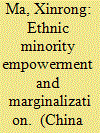

|
|
|
|
|
| Summary/Abstract |
While there is an emerging body of literature that examines labour resistance within industrial cities in China, there is, however, little research on ethnic minority labour migrants, in particular their interaction with the local state in migrant-receiving cities. This study fills this research gap by focusing on ethnic Yi labour migrants in the Pearl River Delta area. Based on seven and a half months of fieldwork, this article illustrates the ways in which local governments cope with Yi labour disputes on the one hand, and the strategies that Yi migrants developed – emphasizing their minority status while negotiating their labour rights – on the other. The article finds that a strategy to maintain stability by applying patronage selectively to certain ethnic groups cultivates ethnic elites as middlemen to appease workers’ collective disputes in the short term. However, the state’s failure to fully recognize cultural differences of ethnic minorities and to protect their labour rights results in more resistance and marginalization of ethnic minority labourers in the long term. In this way, the Chinese government’s current policy may jeopardize the wider aim of maintaining social order.
|
|
|
|
|
|
|
|
|
|
|
|
|
|
|
|
| 14 |
ID:
120007
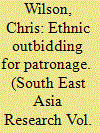

|
|
|
|
|
| Publication |
2013.
|
| Summary/Abstract |
Do local systems of patronage in Indonesia cause or prevent intercommunal violence? In analysing the September 2010 ethnic riots in Tarakan, East Kalimantan, this article illustrates one mechanism by which clientelism can lead to violent communal conflict. Ethnic organizations claiming to represent the marginalized indigenous community engaged in a form of 'ethnic outbidding' in order to intimidate their way into local patronage networks. Apparent leadership of an aggrieved indigenous community gave organizations access to state resources that they would not otherwise have had. In order to sustain this status, however, these organizations were obliged to respond vigorously to any apparent insults to the community, thereby increasing the risks of intercommunal conflict.
|
|
|
|
|
|
|
|
|
|
|
|
|
|
|
|
| 15 |
ID:
121833
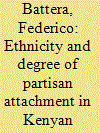

|
|
|
|
|
| Publication |
2013.
|
| Summary/Abstract |
The present analysis disaggregates election results and voter turnout according to the voters' ethnic background during a time span which covers three electoral processes (1997-2007) in Kenya. The two data combined produced an index which was called the 'degree of mobilization index'. Given that most of the Kenyan parties proved to be ethnic or made of ethnic alliances, voter turnout was found crucial in differentiating the degree of ethnic mobilization. Ethnicity alone, however, failed to explain these differences. The findings were likely linked to the past record of patronage for the five selected ethnic groups and the ability of such groups to provide a cohesive ethnic leadership.
|
|
|
|
|
|
|
|
|
|
|
|
|
|
|
|
| 16 |
ID:
088419
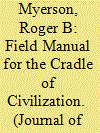

|
|
|
|
|
| Publication |
2009.
|
| Summary/Abstract |
The U.S. Army's Counterinsurgency Field Manual, Bremer's My Year in Iraq, and Xenophon's Education of Cyrus all consider problems of establishing a state. Bremer sees constitutions as fundamental, and the Field Manual emphasizes local security operations and effective governance to establish legitimacy. But Xenophon shows how states are founded by leaders with reputations for reliably rewarding supporters. Agency incentive problems in government make patronage an essential aspect of state-building, and political leaders become fundamentally constrained by their reputations. Democratic competition requires many leaders to develop independent reputations for exercising power and patronage responsibly, which can be encouraged by political decentralization.
|
|
|
|
|
|
|
|
|
|
|
|
|
|
|
|
| 17 |
ID:
118235
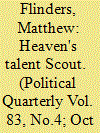

|
|
|
|
|
| Publication |
2012.
|
| Summary/Abstract |
In the last decade the role of the Prime Minister in the process for making senior Church appointments has changed significantly. The man who replaces Dr Rowan Williams-and it will be a man-will be appointed through a procedure in which the Prime Minister is expected to enjoy no choice but to simply confirm the Church of England's preferred candidate. The aim of this article is to draw upon fresh empirical research in order to explore why and how the politics and governance of ecclesiastical patronage has been recalibrated in this way. More importantly this article seeks to embed the study of ecclesiastical patronage within a much broader appreciation of how other forms of ministerial patronage have also become tightly constrained. This, in itself, forges a connection between the role of politicians in senior Church appointments, on the one hand, and a much richer and broader seam of research and writing that poses distinct questions about the nature of modern governance, the benefits of depoliticisation, the accountability of appointment commissions, the capacity of politicians and the future of democracy.
|
|
|
|
|
|
|
|
|
|
|
|
|
|
|
|
| 18 |
ID:
145444
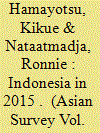

|
|
|
|
|
| Summary/Abstract |
The new Indonesian president, Joko Widodo (“Jokowi”), has faced formidable challenges on a number of fronts in his first year in office. Although Jokowi has managed to roll out his pet projects for the poor, management of competing partisan and personal interests as well as the economy and religious conflict continues to be a challenge. Overall, the new government’s contribution to democratic reforms has been modest thus far.
|
|
|
|
|
|
|
|
|
|
|
|
|
|
|
|
| 19 |
ID:
085533
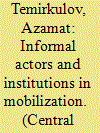

|
|
|
|
|
| Publication |
2008.
|
| Summary/Abstract |
Mobilization in the south of Kyrgyzstan immediately prior to and during the March events was, it is argued here, a very complex process. Using a framework of incentives, the author illustrates that people were encouraged to protest through a mix of purposive, material and solidarity incentives, and that within this mix, grievances often occupied a secondary place. The following elements are highlighted in the run-up to mobilization in the south: conjuncture; patronage networks based on traditional solidarity (tooganchilik); and pre-existing organizations and institutions, such as the institutions of the aksakal (elder), kurultai (assembly) and palvan (wrestler)
|
|
|
|
|
|
|
|
|
|
|
|
|
|
|
|
| 20 |
ID:
120006
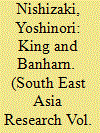

|
|
|
|
|
| Publication |
2013.
|
| Summary/Abstract |
Duncan McCargo's influential model of 'network monarchy' enables us to understand how King Bhumibol Adulyadej has mobilized his nationwide patronage network to shape contemporary Thai politics. This model, however, focuses mainly on the conflicts between reform-minded virtuous leaders (represented by Bhumibol) and unprincipled, self-serving politicians, and pays insufficient empirical attention to the porous boundaries between the two. The author makes up for this weakness by unravelling the historical process through which Bhumibol has developed a symbiotic, if ambiguous, relationship with Banharn Silpa-archa, regarded as the epitome of unscrupulous rural-based politicians. The author shows that the two have used each other for their respective political purposes. In an effort to protect and advance his personal and dynastic interests, Bhumibol has found it necessary and expedient to rely on Banharn as a valuable political ally. Banharn, for his part, has relied on the king and his proxies to legitimate and consolidate his authority at the local level. By casting light on this interdependence between the two seemingly contrasting types of leader, the paper contributes to a further elaboration of McCargo's model and, more generally, to a deeper understanding of the complexity of Thailand's patronage politics.
|
|
|
|
|
|
|
|
|
|
|
|
|
|
|
|
|
|
|
|
|